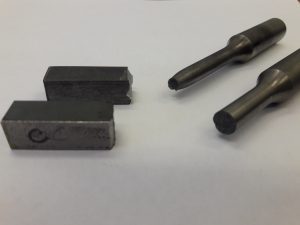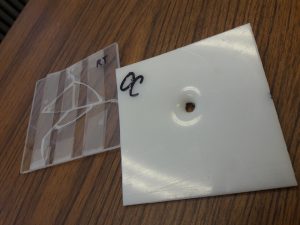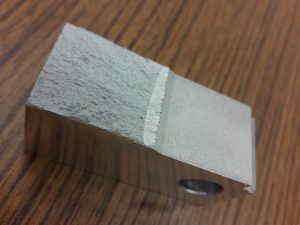


Who doesn’t love to break stuff?! In the first week of this lab, students get hands-on experience with one of the most familiar topics in MatSE: stress-strain curves. Metal samples are pulled in tension until failure, and the resulting curves analyzed. Rockwell hardness tests are also performed on all the samples prior to tensile testing. In the second week of the lab, students watch a demo on fracture toughness, and perform impact tests on both metal and polymer samples. During the impact tests, weights are dropped onto the sample from a height in order to observe the fracture behavior. By varying the temperature between 0 and 100C, the students can observe firsthand how the behavior changes, especially for samples that undergo a brittle to ductile transition. This is one of our most popular labs, and it uses the Mechanical Testing Instructional Laboratory (MTIL) facilities in Talbot Laboratory. Oh, and students (and instructors…) are allowed to take home their broken specimens as souvenirs!
PROCEDURE – MECHANICAL TESTING
Equipment Used
- Rockwell hardness testers (Rockwell B scale)
- Instron Model 4483 load frames with Instron Bluehill software
- Clip-on Extensometer
- MTS Model 810 test frame (for fracture toughness and pre-crack formation)
- Crack Opening Displacement (COD) gauge
- Dynatup Impact Testers (Model 8250 for Charpy and Model 8200 for plate samples)
- Baths of iced and boiling water
Note: More detailed information on the equipment used can be found on the MTIL website (see link above)
Materials Tested
- Steel (normalized and cold-rolled) and aluminum alloys for stress-strain and hardness tests (alloys vary by semester, often 1045 steel)
- Compact tensile specimen of Al (same alloy as above) for fracture toughness testing
- Steel and aluminum alloys (same as above, except steel is hot-rolled) for Charpy impact testing
- Two plastic samples for plate impact testing (usually PMMA and one other)
- Cast iron and brass for tensile testing demos